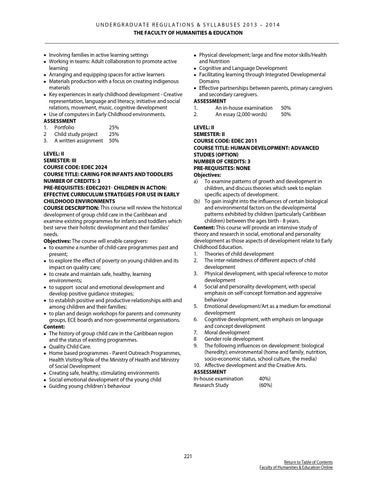UNDERGRADUATE REGULATIONS & SYLLABUSES 2013 – 2014 THE FACULTY OF HUMANITIES & EDUCATION
• Involving families in active learning settings • Working in teams: Adult collaboration to promote active learning • Arranging and equipping spaces for active learners • Materials production with a focus on creating indigenous materials • Key experiences in early childhood development - Creative representation, language and literacy, initiative and social relations, movement, music, cognitive development • Use of computers in Early Childhood environments. ASSESSMENT 1. Portfolio 25% 2 Child study project 25% 3. A written assignment 50%
• Physical development; large and fine motor skills/Health and Nutrition • Cognitive and Language Development • Facilitating learning through Integrated Developmental Domains • Effective partnerships between parents, primary caregivers and secondary caregivers. ASSESSMENT 1. An in-house examination 50% 2. An essay (2,000 words) 50% LEVEL: II SEMESTER: II COURSE CODE: EDEC 2011 COURSE TITLE: HUMAN DEVELOPMENT: ADVANCED STUDIES (OPTION) NUMBER OF CREDITS: 3 PRE-REQUISITES: NONE Objectives: a) To examine patterns of growth and development in children, and discuss theories which seek to explain specific aspects of development. (b) To gain insight into the influences of certain biological and environmental factors on the developmental patterns exhibited by children (particularly Caribbean children) between the ages birth - 8 years. Content: This course will provide an intensive study of theory and research in social, emotional and personality development as those aspects of development relate to Early Childhood Education. 1. Theories of child development 2. The inter-relatedness of different aspects of child development 3. Physical development, with special reference to motor development 4 Social and personality development, with special emphasis on self-concept formation and aggressive behaviour 5. Emotional development/Art as a medium for emotional development 6. Cognitive development, with emphasis on language and concept development 7. Moral development 8 Gender role development 9. The following influences on development: biological (heredity); environmental (home and family, nutrition, socio-economic status, school culture, the media) 10. Affective development and the Creative Arts. ASSESSMENT In-house examination 40%) Research Study (60%)
LEVEL: II SEMESTER: III COURSE CODE: EDEC 2024 COURSE TITLE: CARING FOR INFANTS AND TODDLERS NUMBER OF CREDITS: 3 PRE-REQUISITES: EDEC2021- CHILDREN IN ACTION: EFFECTIVE CURRICULUM STRATEGIES FOR USE IN EARLY CHILDHOOD ENVIRONMENTS COURSE DESCRIPTION: This course will review the historical development of group child care in the Caribbean and examine existing programmes for infants and toddlers which best serve their holistic development and their families’ needs. Objectives: The course will enable caregivers: • to examine a number of child-care programmes past and present; • to explore the effect of poverty on young children and its impact on quality care; • to create and maintain safe, healthy, learning environments; • to support social and emotional development and develop positive guidance strategies; • to establish positive and productive relationships with and among children and their families; • to plan and design workshops for parents and community groups, ECE boards and non-governmental organisations. Content: • The history of group child care in the Caribbean region and the status of existing programmes. • Quality Child Care. • Home based programmes - Parent Outreach Programmes, Health Visiting/Role of the Ministry of Health and Ministry of Social Development • Creating safe, healthy, stimulating environments • Social emotional development of the young child • Guiding young children’s behaviour
221 Return to Table of Contents Faculty of Humanities & Education Online
